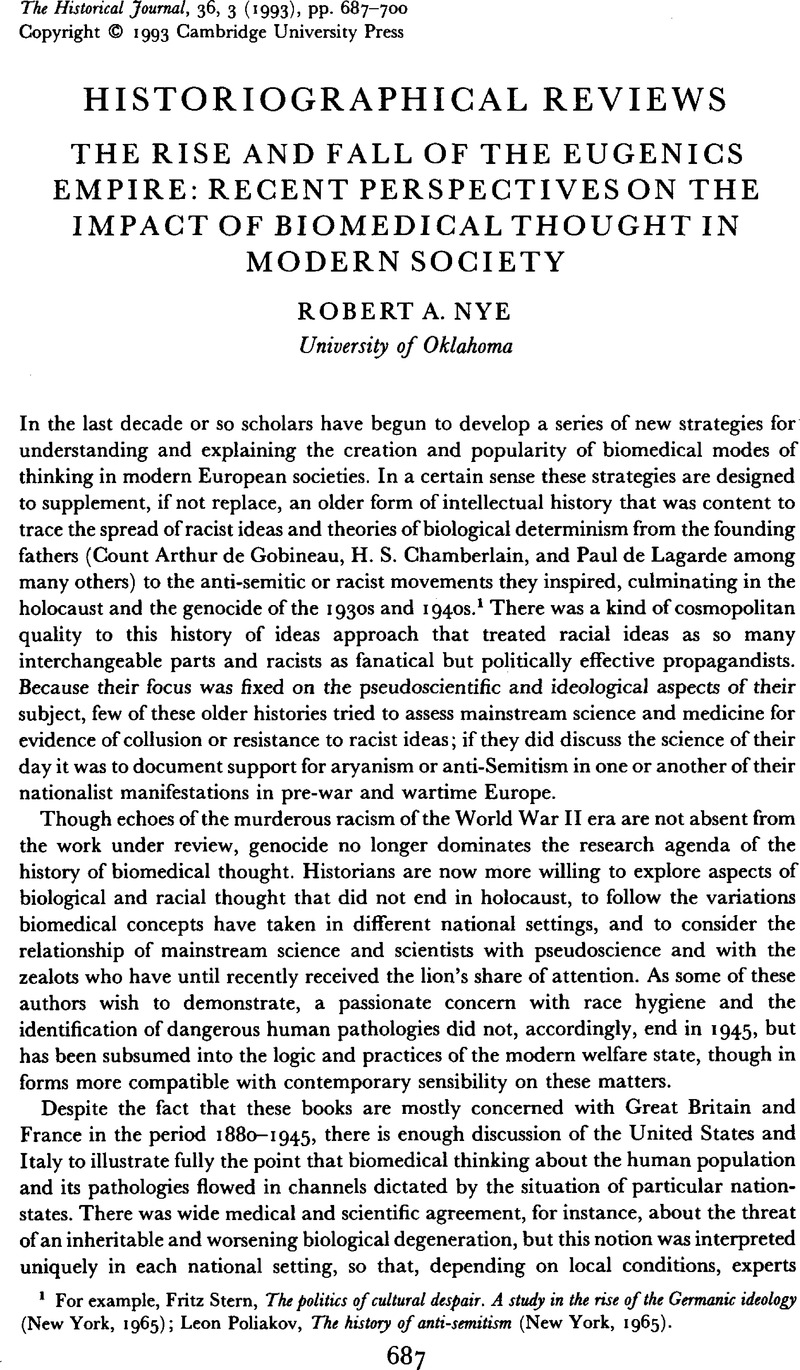Article contents
The rise and fall of the Eugenics empire: recent perspectives on the impact of biomedical thought in modern society
Published online by Cambridge University Press: 11 February 2009
Abstract

- Type
- Historiographical Reviews
- Information
- Copyright
- Copyright © Cambridge University Press 1993
References
1 For example, Stern, Fritz, The politics of cultural despair. A study in the rise of the Germanic ideology (New York, 1965)Google Scholar; Poliakov, Leon, The history of anti-semitism (New York, 1965)Google Scholar.
2 Pick, Daniel, Faces of degeneration. A European disorder, c. 1848–c. 1918 (Cambridge, 1989), p. 59CrossRefGoogle Scholar.
3 Ibid. p. 21.
4 Ibid. p. 209.
5 Ibid. p. 180.
6 On the fear of population decline see LeBras, Hervé, Marianne et les lapins. L'Obsession démographique (Paris, 1991)Google Scholar.
7 Many of these themes have been explored in Harris, Ruth, Murder and madness: medicine, law and society in the Fin de Siècle (Oxford, 1989)Google Scholar. For the way that the medical outlook was refracted through literature in the nineteenth century see Rothfield, Lawrence, Vital signs. Medical realism in nineteenth-century fiction (Princeton, N.J., 1992)Google Scholar; Gilman, Sander, Difference and pathology. Stereotypes of sexuality, race, and madness (Ithaca, N.Y., 1985)Google Scholar; Silverman, Debora L., Art nouveau in Fin-de-Siècle France. Politics, psychology and style (Berkeley, 1989), pp. 63–108Google Scholar.
8 For example, Nye, Robert A., Crime, madness and politics in modern France. The medical concept of national decline (Princeton, N.J., 1984)Google Scholar; Donzelot, Jacques, The policing of families, trans. Hurley, Robert (New York, 1979)Google Scholar; Fuchs, Rachel, Poor and pregnant in Paris. Strategies for survival in the nineteenth century (New Brunswick, N.J., 1992)Google Scholar; Ruth Harris, Murder and madness. On the influence of degeneration theory on psychiatry see Dowbiggin, Ian, Inheriting madness. Professionalization and psychiatric knowledge in nineteenth-century France (Berkeley, 1991)Google Scholar.
9 For an account of the politics of medicine that includes the notion of medicalization in the Foucauldian sense see Léonard, Jacques, La Médecine entre les pouvoirs et les savoirs. Histoire intellectuelle et politique de la médecine française au XIXe siècle (Paris, 1981)Google Scholar.
10 Hildreth, Martha has written about this aspect in the history of medical organization in Doctors, bureaucrats and public health in France, 1888–1902 (New York, 1987)Google Scholar.
11 For a view of the cholera epidemics that emphasizes the Foucauldian notion of medicalization see Delaporte, François, Disease and civilization: the cholera in Paris, 1832, trans, Goldhammer, Arthur (Cambridge, Mass., 1986)Google Scholar; a similar point of view informs Bourdelais, Patrice and Raulot, Jean-Yves, Une Peur bleue: Histoire du choléra en France, 1832–1854 (Paris, 1987)Google Scholar. On the vexed issue of the nature of the Pasteurian revolution and the reasons for its success see Latour, Bruno, The Pasteurization of France, trans. Sheridan, Alan and Law, John (Cambridge, Mass., 1988)Google Scholar; and Solomon-Bayet, Claire, ed., Pasteur et la Révolution Pastorienne (Paris, 1986)Google Scholar.
12 Ackerman, Evelyn, Health care in the Parisian countryside, 1800–1314 (New Brunswick, N.J., 1990). p. 136Google Scholar.
13 For a survey of the European implications of biological models in this era see Rabinbach, Anson, The human motor. Energy, fatigue, and the origins of modernity (New York, 1990)Google Scholar. On the gendering of work in France see Stewert, Mary Lynn, Women, work and the French state, labour protection and social patriarchy, 1879–1919 (Montreal, 1989)Google Scholar. The implications of degeneration theory for sexuality are discussed in Nye, Robert A., Masculinity and male codes of honor in modern France (New York, 1993), pp. 72–126Google Scholar.
14 An excellent survey of many of these ideas and their impact on public policy may be found in Mort, Frank, Dangerous sexualities. Medico-moral politics in England since 1830 (London, 1987)Google Scholar. On sexuality in particular see Weeks, Jeffrey, Sex, politics and society. The regulation of sexuality since 1800, 2nd edn (London, 1989)Google Scholar; Russet, Cynthia Eagle, Sexual science. The Victorian construction of womanhood (Cambridge, Mass., 1989)Google Scholar; Dijkstra, Bram, Idols of perversity. Fantasies of feminine evil in Fin-de-Siècle culture (New York, 1986)Google Scholar.
15 For a recent comparative evaluation of the eugenics movement see Adams, Mark B., ed., the wellborn science: eugenics in Germany, France, Brazil and Russia (New York, 1990)Google Scholar.
16 As quoted in Mazumdar, Pauline M. H., Eugenics, human genetics and human failings. The Eugenics Society, its sources and its critics in Britain (London, 1992), p. 129Google Scholar.
17 As quoted in ibid. p. 161.
18 As quoted in Barkan, Elazar, The retreat of scientific racism. Changing concepts of race in Britain and the United States between the World Wars (Cambridge, 1992), p. 28Google Scholar.
19 Kevles, Daniel J., In the name of eugenics. Genetics and the uses of human heredity (Berkeley, 1985)Google Scholar.
- 21
- Cited by




